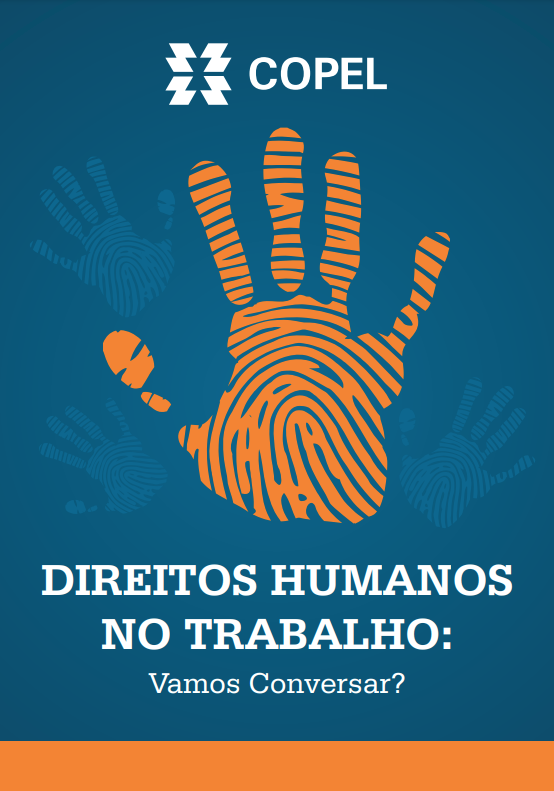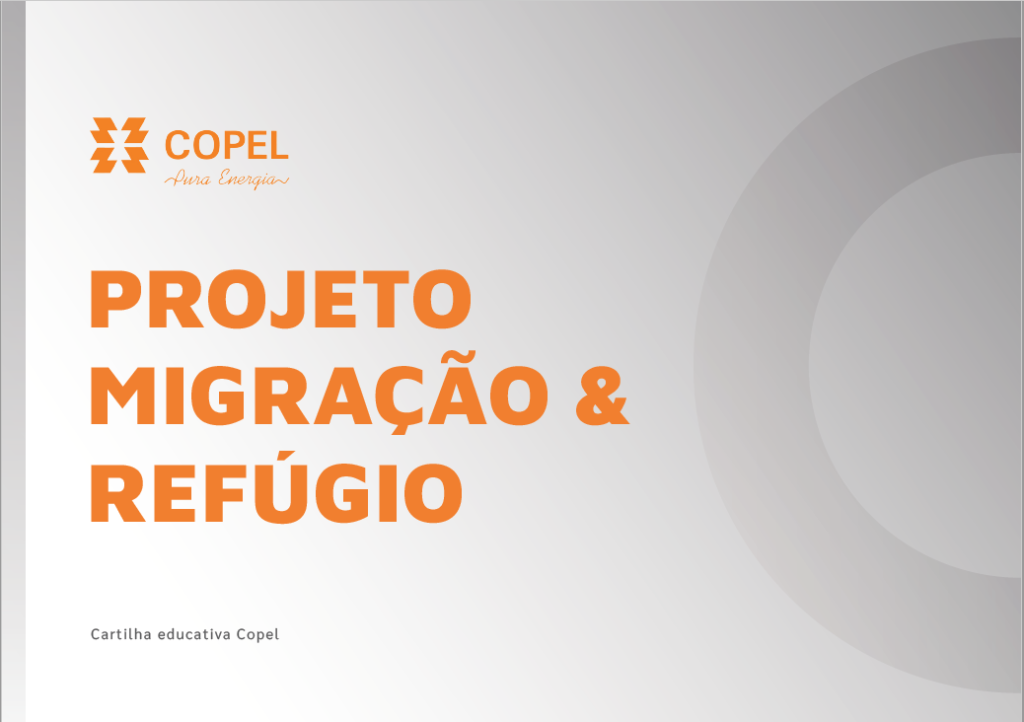Human Rights
Copel, committed to respecting Human Rights and aligned with the UN Guiding Principles on Business and Human Rights, understands that it is its responsibility to prevent and mitigate related risks, as well as provide for the remediation of violations that may occur within its sphere of influence, in addition to respecting the rights guaranteed by the Federal Constitution and the Universal Declaration of Human Rights.
In this sense, Copel has guidelines in its regulations, promotes actions with its stakeholders and produces specific materials, according to the risks and opportunities it identifies. The Company is also represented in the Human Rights Work Group of the Global Compact Network Brazil, which allows for the sharing of experiences with other companies and keeps it updated regarding the best Sustainability practices.
To learn more about the initiatives and results, access the Company’s Integrated Reports.
To report human rights violations at Copel and its partners and suppliers, access the Reporting Channel.
Human Rights Governance at Copel
Copel’s Sustainable Development Committee (CDS) is an independent, consultative and permanent body, providing advice to the Board of Directors in the scope of the sustainable development of the Company and its subsidiaries, with an emphasis on the environmental, social and corporate governance dimensions. (ASG), including the theme of Human Rights. The Committee meets ordinarily every month and its reports are presented to the Board of Directors.
The Sustainability Policy, Chapter 3: Human Rights, provides general guidelines on the subject for Copel, which areapplicable to its own employees, outsourced employees, partners, suppliers and communities. These guidelines are divided into rules provided for in the internal standard (NAC 030373) Human Rights – Protection and Due Diligence. Each area adopts the necessary procedures to comply with them, depending on the content of its activities. Copel regularly monitors indicators related to the topic and coordinates actions and training in order to increase internal knowledge of it and maintain compliance.
Risk Assessment, Remediation and Mitigation
Copel has procedures for classifying and evaluating its activities and those of its suppliers regarding the risks of human rights violations. Copel’s evaluation and Due Diligence rules are described in the internal standard (NAC 030373) Human Rights – Protection and Diligence. The document determines that periodic inspections be carried out in the supply chain in order to verify whether working conditions adequately meet the requirements related to the preservation of Human Rights, including an inspection questionnaire for suppliers.
If problems related to human rights are identified, Copel’s internal standard (NAC 030373 on Human Rights) determines that the responsible area – service contractor or supplier company – must prepare and execute a remediation plan containing measures to interrupt such situation and repair the impacted parts, limiting, with the necessary agility, the extent of this damage so that the losses are as small as possible to the population or other parties involved in the identified situation.
In order to guide the classification of human rights risks, the company has made available the Corporate Manual for Identifying and Prioritizing Human Rights Risks, with a methodology developed internally that makes it possible to define which activities and suppliers are critical in terms of human rights, i.e. those that represent the greatest risk of violations, due to the characteristics and nature of the activities carried out.
Own Operations
Copel considers that, given the compliance mechanisms and internal processes that are structured and certified, its own activities do not pose critical risks of violating the Human Rights of its own employees, such as, for example, imprisonment, debt bondage, mistreatment and violence, exhausting working hours, poor nutrition, among others.
The company recognizes that it may be exposed to labor and workplace safety risks. Therefore, there are a series of guidelines, standards, procedures and measures to prevent and mitigate such risks.
The variable remuneration of all Copel hierarchical levels reinforces the commitment, as it is directly impacted by the goal of zero fatalities in the workforce, which includes both its own employees and outsourced employees.
However, Brazilian labor legislation, which is mandatory, imposes the adoption of protective and supervisory principles and rules in the labor and safety aspects complied with by Copel.
All plants have mitigation plans, as required by law. Additionally, Copel has ISO 14001 certification – Environmental Management System for 8 hydroelectric plants; the OHSAS 18001 certification – Occupational Health and Safety Management Systems for 3 hydroelectric plants; and ISO 45001 certification – Occupational Health and Safety Management System for 8 hydroelectric plants.
Suppliers
The Company’s suppliers must comply with Copel’s Code of Conduct and are subject to assessment regarding their criticality in terms of Human Rights.
In 2024, Copel Geração e Transmissão sought to inspect 100% of mowing contracts, regardless of the method used (37% mechanized and 37% manual). To date, no problems of human rights violations have been identified in these contracts. Activities continue to be monitored, ensuring compliance with the established safety criteria. In addition, the goal is to increase the mechanization of mowing in transmission, with an annual target of 51% mechanized execution by the end of 2028.
With regard to works contracts, 100% of the current contracts that are in the field works stage, which takes place after the preliminary design stage, have been acted on. Field inspectors are assigned to every new contract. In the year 2024, no irregularities were identified.

Due Diligence
To improve its performance in relation to human rights, Copel has developed a due diligence process that allows it to identify, mitigate and respond to adverse impacts caused or potential risks, considering all its activities and operations, as well as internal and external public.
Human rights due diligence is a tool that contributes to guaranteeing the protection of workers’ rights, as well as preserving the sustainability of the company’s processes and services, which generates and distributes energy in a clean way, considering social justice in its choices and procedures.
The guidelines of the process are defined in an administrative rule, which expands the scope of the preventive actions, including the obligation to carry out field inspections, considering the diverse contexts, complexities, activities and publics of the company: own employees, outsourced workforce, partners and suppliers, as well as women, children, indigenous peoples, riverside populations, migrant workers and any groups that find themselves in vulnerable situations.
Due diligence in human rights reinforces the commitments already assumed by Copel in its sustainability policy (Chapter 3 – Human Rights) and in its code of conduct, which opposes and combats any form of discrimination – whether due to characteristics such as skin color, origin, sexual orientation, biological sex, gender identity, age, disability, religion, culture, financial condition, social class and the like.
Copel is against any degrading work condition, not tolerating any form of forced labor, child labor and human trafficking. The Company’s policies guide its conduct throughout the value chain, prioritizing equity and decent work, therefore, among Copel’s six priority SDGs is SDG 8 – Decent Work and Economic Growth.
In addition, the Company guarantees, supports and encourages freedom of association, the right to collective bargaining, and equal pay.
Thus, periodic actions are planned for the mapping of impacts, risk prevention, as well as the preparation of mitigation plans and remediation of impacts if necessary.
Human Rights Due Diligence Process 2024/2025
Current Practices
Copel establishes in its labor outsourcing contracts that the outsourced employees have the same health and safety conditions and access to basic benefits enjoyed by its own employees, such as transportation and meals. To this end, it is inspected on a monthly basis whether the benefits provided for the category, whether in law or in Collective Agreement instruments, are being guaranteed.

To further improve the monitoring of these practices, the study of critical suppliers at Copel Distribuição was reviewed by the subcommittee responsible for this topic, which classifies suppliers and third parties according to their degree of dependence, social and environmental risks.
The objective of the study is to identify suppliers that present a potential risk of disrespecting human rights or that may cause negative socio-environmental impacts.
Copel’s selection and contracting processes require, as a condition for participation in bidding contests, a self-declaration from suppliers, attesting to the commitment with aspects related to environmental and social sustainability, which is a condition for contracting with the Company.
As a form of diligence to this declaration, Copel observes the list of employers that have submitted workers to conditions analogous to slavery, available on the website of the Ministry of Labor and Employment (MTE), disqualifying companies that are on this list.
Safety Inspections
The performance of suppliers (both with regard to quality and to occupational health and safety compliance) is diligently monitored during contractual execution.
For the service contracts, the Preserving Life Program (PPV) establishes the supervision, in the field, of the technical and safety procedures, during the execution of the activities of employees and contractors, according to the standards of the Labor Health and Safety Management System (GSST), issuing a report with a score of the flaws found and proposing solutions for the necessary cases.
For the employees who carry out the inspections, Field Inspectors Training courses are provided that aim to improve the preventive vision in order to identify and block the agents of occupational diseases and accidents.
It is worth noting that the inspectors also have access to the PPV through smartphones and tablets.

Sustainability Assessment
Another practice that helps in the inspection is the Sustainability Evaluation, which contributes to the understanding of the stage at which Copel’s suppliers are in issues related to the theme.
In 2022, it was included as one of the categories of the Supplier Award, with the objective of monitoring the sustainability practices of suppliers eligible for the categories of the Supplier Award of Copel DIS, in order to identify weaknesses to be developed with this stakeholder.
Copel Distribuição has been advancing in involving its suppliers in an increasingly sustainable supply chain. In this perspective, in 2023, it implemented the practice of sustainability assessment for the 2nd level of the supply chain. Initially, the questionnaire was sent to all suppliers with contracts that allow subcontracting and to subcontractors.
In 2024, the Copel DIS Supplier Award, in its 8th edition, featured something new: the “Outstanding Achievement in Management and Sustainability” award, which honored the best micro and small company and the best medium and large company.
In addition to the criteria laid down in the General Regulations for the award, specific eligibility criteria were also observed for the category, such as: Social Responsibility / Human Rights; Environmental Responsibility; Governance, and anti-corruption and Management.
The practice of self-assessment of management and sustainability by suppliers has proved to be an important tool for identifying maturity and gaps in the procedures and values that guide operations, strengthening transparency, continuous improvement and a culture of compliance and innovation in the supply chain.
Rewarding suppliers who adopt best practices is a way of recognizing and valuing their commitment to sustainability, reinforcing their alignment with Copel’s values and objectives. This recognition not only creates a direct motivation for the winners to maintain or improve their practices, but also generates an inspiring and competitive effect among the others.
Therefore, the practice of management and sustainability self-assessment, and its recognition, not only supports compliance with organizational and regulatory targets, but also contributes to building lasting strategic partnerships, adding value to the supply area and consolidating Copel’s position as an agent of sustainable transformation in the energy sector.
Human Rights Program
Copel has, since 2018, the Human Rights Program, aligned to UN Guiding Principleson Business and Human Rights, based on the following practices:
- Analysis, preparation and refinement of policies and standards of Copel for prevention, inspection and mitigation of violations;
- Producing and divulging didactic materials, with information on Copel’s reporting channels (hotlines) to be accessed if violations are identified;
- Providing courses, talks and actions for sensitization, targeting the internal public, external contractors, the chain of production and the local community;
The Human Rights Program is related to the Sustainable Development Objectives, especially SDO 8 – Decent Work and Economic Growth, which is one of the 5 ODS prioritized by Copel and by the Brazilian electric power industry.

Human Rights Policy
In April 2020, the Company took an important step when launching its Human Rights Policy that formalizes guidelines for preventing, mitigating and repairing violations that may occur at the Company, in its chain of production or impacted communities. In 2024, the document became a specific chapter of the Sustainability Policy.
Based on it and the Company’s own methodology for identifying human rights risks, relevant measures are established in the several areas of operation of the company.
The policy follows the Universal Declaration of Human Rights established in 1948 by the UN, consisting of basic civil, political, economic and cultural rights common to all human beings.
The document also follows the international standards of the UN Guiding Principles on Companies and Human Rights, of the Global Compact Principles, of the Declaration of the Fundamental Principles and Labor Rights of the International Labor Organization (OIT), and of ISO 26.000/2010: Social Responsibility.
The Policy guides Copel’s Human Rights Program, guided by the same documents and initiatives, as well as the Company’s other practices.
The specific chapter on human rights guidelines can be consulted in Copel’s Sustainability Policy.
Human Rights Booklet
The Universal Declaration of Human Rights was published by the United Nations Organization (ONU) in 1948.
Since then, many studies, materials, and policies have been produced to guide and try to ensure the fulfillment of such rights for all people.
Copel’s Human Rights Booklet aims to disseminate basic information on the subject to its employees, suppliers and other interested parties, contributing to the recognition of the importance of the subject among its publics.

Human Rights Video
This video is part of a set of materials created with the objective of disseminating the importance of the Human Rights theme to the Company’s internal and external publics.
Migration and Refuge Booklet
Paraná is one of the states that most received migrants and refugees in recent years. Copel identified the demand and the importance of developing a project aimed at this audience.
Therefore, it gathered the main information on access to Copel’s services and social energy programs in booklets, available in 6 languages: Portuguese, English, Spanish, Haitian Creole, Ukrainian and French.
After all, energy is a basic need that contributes and opens doors to other services that are essential for effective citizenship.






